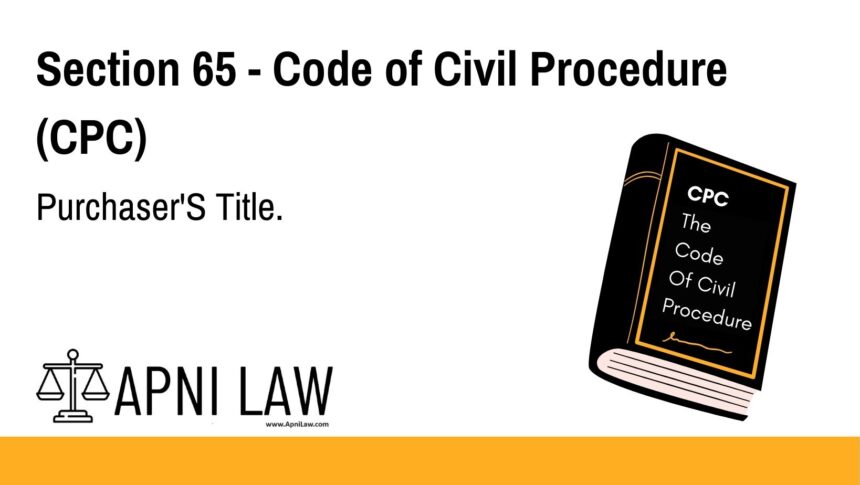Code
CPC Where immovable property is sold in execution of a decree and such sale has
become absolute, the property shall be deemed to have vested in the purchaser from the time when the
property is sold and not from the time when the sale becomes absolute.
Perfect — this is Section 65 CPC dealing with title of purchaser after sale in execution.
Here’s a structured article draft for you:
Section 65 CPC – Purchaser’s Title After Sale in Execution
Code: Section 65 of the Civil Procedure Code, 1908
65. Purchaser’s title.
Where immovable property is sold in execution of a decree and such sale has become absolute, the property shall be deemed to have vested in the purchaser from the time when the property is sold and not from the time when the sale becomes absolute.
Explanation of Section 65 CPC
This section clarifies when ownership passes to the purchaser of immovable property sold through court auction.
- Sale in Execution of Decree:
- The property of a judgment-debtor may be sold by court auction in execution of a decree.
- When Does the Title Vest?
- Though the sale becomes effective only when it is confirmed by the court (under Section 65 r/w Order XXI, Rule 92 CPC), the purchaser’s title is deemed to relate back to the date of the auction sale itself, not the date of confirmation.
- Doctrine of Relation Back:
- The legal fiction is created so that the purchaser’s ownership is retrospective from the date of auction.
- This prevents disputes over transfers, encumbrances, or claims made in the interim between auction and confirmation.
Illustrations
- Example 1: A house is sold in execution on 1st January. The sale is confirmed on 1st March. The purchaser’s ownership is deemed effective from 1st January, not 1st March.
- Example 2: If the judgment-debtor mortgages the property to someone on 15th January (after auction but before confirmation), the mortgage is invalid because title is treated as already vested in the auction purchaser.
Judicial Interpretation
- Janak Raj v. Gurdial Singh (AIR 1967 SC 608): Held that purchaser’s rights relate back to the date of sale, though confirmation is necessary for finality.
- B. Arvind Kumar v. Govt. of India (2007) 5 SCC 745: Reaffirmed that once the sale is confirmed, ownership dates back to the date of sale.
- Raja Mohammad Amir Ahmad Khan v. Municipal Board Sitapur (AIR 1965 SC 1923): Clarified that this doctrine protects the purchaser against intervening claims.
Common Questions and Answers
1. When does the purchaser become the owner — on auction or confirmation?
The purchaser becomes the owner only after confirmation of sale, but his title relates back to the date of auction.
2. What happens to encumbrances created by the judgment-debtor after auction but before confirmation?
They are invalid, since title is deemed to have vested in the purchaser from the auction date.
3. Does this rule apply to movable property sales also?
No. Section 65 specifically applies to immovable property.
4. What is the significance of “deemed to have vested”?
It creates a legal fiction ensuring that no third-party rights intervene between auction and confirmation.
Conclusion
Section 65 CPC establishes the doctrine of relation back in judicial sales: once a court confirms the sale of immovable property, the purchaser’s title is effective from the date of sale itself. This ensures certainty, protects purchasers, and prevents fraudulent dealings by judgment-debtors in the interim.
For more resources on CPC execution proceedings, visit ApniLaw.








